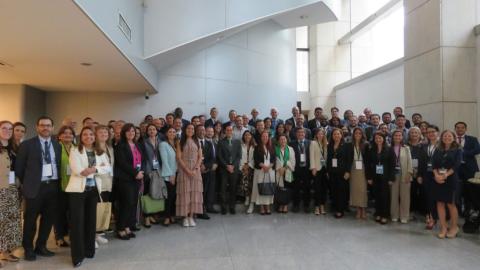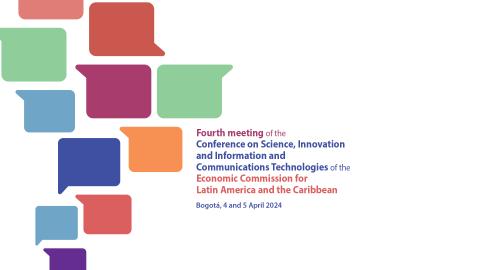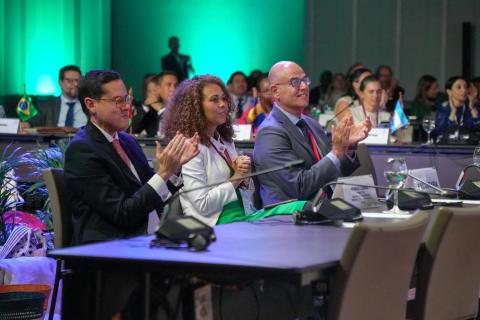News
(19 August 2010) Country representatives participating in the Regional Dialogue on the Costs of International Connections and their Impact on Broadband Prices agreed to advance in the sustainable development of the regional broadband market, promote the expansion of fiber optic infrastructure in the region and implement means to disseminate best practices in broadband policies.
The meeting, held in the headquarters of the Economic Commission for Latin America and the Caribbean (ECLAC) in Santiago, was opened by Antonio Prado, ECLAC Deputy Executive Secretary, and Jorge Atton, Undersecretary of Telecommunications of Chile, the country that proposed the creation of this instance for regional dialogue.
"ECLAC joined the wise initiative of the government of Chile to promote the creation of a regional dialogue that our countries may use to share knowledge and approaches for the development of policies geared at massifying broadband," stated Prado.
Mario Cimoli, Director of the Production, Productivity and Management Division at ECLAC and who moderated the debate sessions, said: "We believe that a meeting of this kind is important above all because it promotes regional integration."
Participants noted that the region is lagging behind the rest of the world in access and use of broadband as a result of the high prices of the service and the low income levels of its population.
Price and income differences make the monthly fee of access to Internet at a velocity of 1Mbps - that is, broadband - in developed countries to be less than 1% of people's average monthly income, while in many Latin American and Caribbean nations, the price surpasses 10% of average monthly income.
That is why countries should work towards lowering broadband prices so as to allow greater digital inclusion, especially in a low-income region such as Latin America and the Caribbean.
Considering the situation of the broadband market in the region, participants to the meeting signed a work agreement to coordinate multilateral efforts. ECLAC will act as Technical Secretariat of this group of countries, coordinating and facilitating dialogue and disseminating the results of this first meeting to other countries in the region interested in participating.
ECLAC was mandated to conduct a regional diagnosis on broadband demand, assess the limitations of content hosting and collect data on interconnection points and best practices in broadband policies.
The agreements reached during this regional dialogue are in line with ECLAC's proposals set forth in the V LAC-EU Ministerial Forum on the Information Society held in March this year in Segovia, Spain.
There, ECLAC suggested that the deepening of the gap in broadband access could have negative effects on countries' productivity and competitiveness, therefore widening the development gap.
In consequence, ECLAC proposed greater State intervention in order to create conditions for further developing infrastructure, capabilities, applications and contents as essential complements to advancing towards a sustainable and inclusive information society in the region.
The second meeting of the Regional Dialogue on Broadband will take place in Lima, Peru on 20 November this year in the context of the Third Ministerial Conference on the Information Society in Latin America and the Caribbean.
See also:
- Opening words by Antonio Prado, Deputy Executive Secretary of ECLAC
- Agreements of the Regional Dialogue on the Costs of International Connections and their Impact on Broadband Prices (in Spanish)
For enquiries, please contact ECLAC's Public Information and Web Services Section. Email: dpisantiago@cepal.org; telephone: (56-2) 210-2040/2149.



